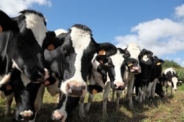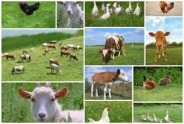Cultural Dynamics
Libby Eiholzer, Bilingual Dairy
Northwest New York Dairy, Livestock & Field Crops
Last Modified: June 14, 2013
Having worked with Hispanic, Spanish-speaking employees for some time now, dairy farm owners and managers have, expectantly, learned a thing or two about the cultural differences between themselves and their employees. Hopefully, they have learned to recognize the similarities as well. Articles in trade magazines, speakers and conferences and others in the industry have provided information on the cultural dynamics that we are witnessing on dairy farms. As farm owners/managers, you are probably familiar with the specifics by now; the need for Dish to get the best channels in Spanish, Phone cards, money orders, shopping, etc. The following, however, is an attempt to explain and important, overarching concept to keep in mind while managing Hispanic employees.
Power Distance
Geert Hofstede's work on Cultural Dynamics introduced this concept. Power distance is the extent to which the less powerful members of institutions and organizations expect and accept that power is distributed unequally. Some cultures, like the United States, emphasize cooperative decision making, teamwork and the perception of equality between employer and employee. This is known and Low power distance. On the other hand, some cultures emphasize hierarchy, order and chain of command. In these cultures of High power distance, an employer is recognized as having the authority and as the decision-maker, while the employees are expected to meet the employer's demands. Hofstede surveyed 53 countries around the world and rated them on a continuum of High to Low power distance. The United States ranks at the bottom of the list at #38 - low power distance. The countries from which most of our Hispanic employees originate, Mexico and Guatemala, rank at the top of the list; #5 and #2 respectively.
How does this impact management on your farm? Consider the differences the management style– generally, we here in the United States invite employee feedback, ask the employees what their work preferences are, and even expect to have our employees make some independent decisions. Our employees, on the other hand, expect to have a Boss. I’ve noticed on so many dairies that the Hispanic employees become frustrated when the manager doesn’t give strong directions. Many Hispanic dairy employees that I’ve met prefer to be given orders and specific job duties. Without orders and duties, a perceived lack of authority could arise and further disgruntle the employees.
So how can we manage this dynamic? Take a command role when managing your Hispanic employees as a group, be a boss while being fair and objective. Make decisions with certitude and give your employees direction rather than acting unsure or asking them what they want. Along with this, make an effort to get to know your employees– if they have family, or if they are buying a plot of land in Mexico. As you build rapport, your employees will learn your individual management style and healthy work relationships will develop.
Cultural Dynamics (pdf; 23KB)
Upcoming Events
2026 Forage Congress
January 28, 2026
Nunda, NY
Register to attend 2026 Forage Congress!
2026 NWNY Dairy Day
February 5, 2026 : NWNY Dairy Day 2026
Perry, NY
Sponsorship and Registration OPEN!
The CCE NWNY Dairy, Livestock and Field Crops team will be holding it's 4th Annual "Dairy Day" on February 5, 2026! We will be bringing the latest in dairy research and hot topics to you with this in-person, 1-day conference.
2026 Soybean & Small Grains Congress
February 11, 2026
Henrietta, NY
Participant Registration for the 2026 Soybean & Small Grains Congress NOW OPEN!
Announcements
Follow us on Instagram
See photos and reels of our most recent events and programs!Join us on Facebook!
Follow us on Facebook to get up to date posts about events, workshops and everything NWNY!Add us on LinkedIn!
Connect with us on LinkedIn to get more information about upcoming workshops and programs!





